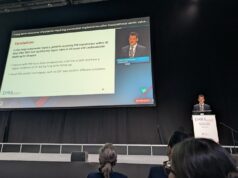 The first trial comparing transcatheter aortic valve implantation (TAVI) to surgical aortic valve replacement (SAVR) in female patients with severe aortic stenosis has shown the transcatheter therapy to be superior for reducing death, stroke or rehospitalisation, investigators have said.
The first trial comparing transcatheter aortic valve implantation (TAVI) to surgical aortic valve replacement (SAVR) in female patients with severe aortic stenosis has shown the transcatheter therapy to be superior for reducing death, stroke or rehospitalisation, investigators have said.
Findings of the RHEIA trial were presented by Helene Eltchianinoff (University Hospital of Rouen, Rouen, France) at the European Society of Cardiology (ESC) 2024 congress (30 August–2 September, London, UK), where she reported that TAVI using the Sapien 3 or Sapien 3 Ultra (Edwards Lifesciences) resulted in a two-fold lower incidence of a composite of all-cause mortality, stroke or rehospitalisation for valve- or procedure-related symptoms or worsening of heart failure at one year.
The primary endpoint occurred in 8.9% of patients undergoing TAVI, compared to 15.6% for those receiving surgery (hazard ratio [HR] 0.55; 95% confidence interval [CI] 0.34 to 0.88; p=0.03).
The significant reduction in the primary endpoint was predominantly driven by a reduction in rehospitalisation for valve- or procedure-related symptoms or worsening heart failure, which occurred in 4.8% in the TAVI group and 11.4% in the surgical group (difference −6.6%; 95% CI −11.9% to −1.4%; p=0.02). There was no significant difference, however, in all-cause mortality or stroke.
Additionally, TAVI was associated with a lower incidence of new-onset atrial fibrillation than surgery at one year (3.3% vs. 28.8%; p<0.001) and shorter median length of index hospital stay (4 days vs. 9 days), but higher rates of new permanent pacemaker implantation (8.8% vs. 2.9%; p=0.01) and mild paravalvular aortic regurgitation at one year (15.5% vs. 2.4%; p<0.001).
The prospective RHEIA trial recruited women all-comers with severe symptomatic aortic stenosis, with any (except prohibitive) surgical risk status, from 48 sites in 12 countries across Europe, randomised 1:1 to undergo either TAVI or surgical valve replacement and followed up for one year.
In total, 443 patients were randomised, with a mean age of 73 years. The mean Society of Thoracic Surgeons (STS) risk score was 2.1–2.2%.
“In women all-comers with severe aortic stenosis, TAVI using Sapien 3 or Sapien Ultra was superior to surgery for the primary composite endpoint of death, stroke and rehospitalisation at one year,” Eltchianinoff told journalists at a press conference at ESC where she shared the results. “This superiority was essentially driven by the lower rate of rehospitalisation.”













